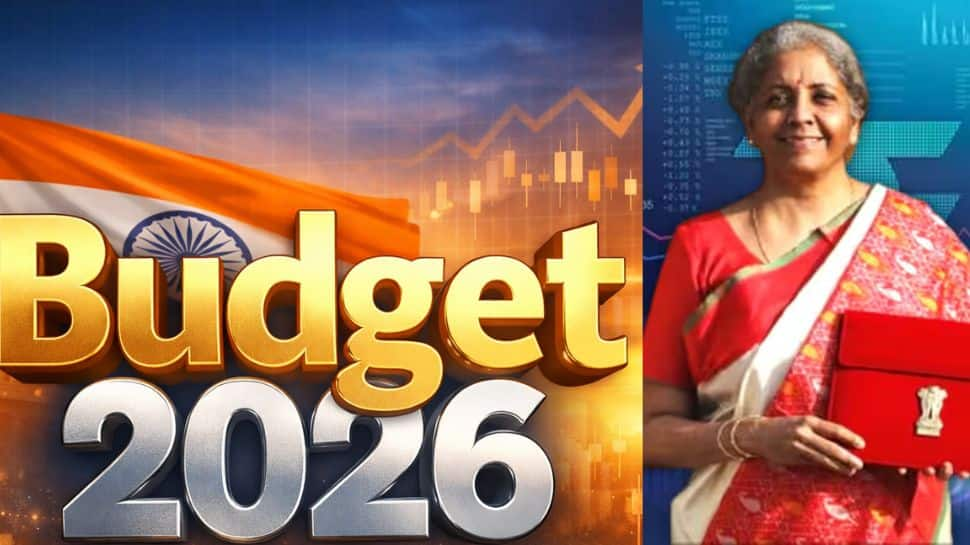Politics
Iran vows reciprocal action after Australia expels envoy
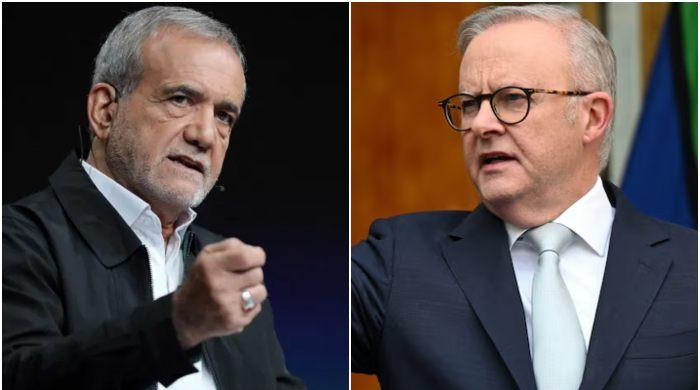
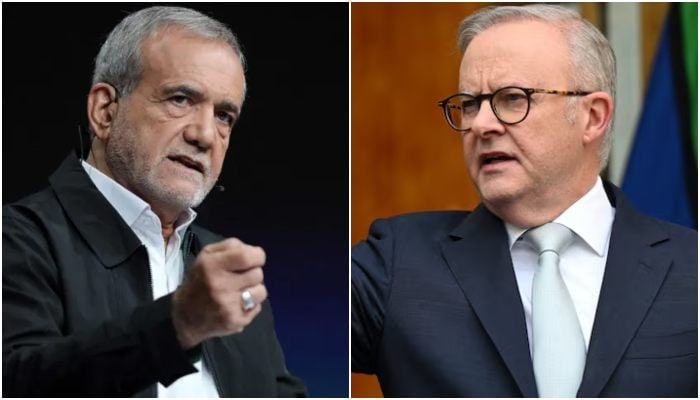
- Iran behind arson attacks on kosher cafe, synagogue: Australian PM.
- Iran’s Ambassador Ahmad Sadeghi declared “persona non grata”.
- Tehran’s envoy, three officials given seven days to leave country.
TEHRAN/SYDNEY: Iran has vowed reciprocal action after Australia expelled its ambassador over accusations that Tehran was behind antisemitic arson attacks in Sydney and Melbourne.
“The accusation that has been made is absolutely rejected,” said foreign ministry spokesman Esmaeil Baqaei during a weekly press conference, adding that “any inappropriate and unjustified action on a diplomatic level will have a reciprocal reaction”.
Australian Prime Minister Anthony Albanese said earlier that Iran was behind the torching of a kosher cafe in Sydney’s Bondi suburb in October 2024, and directed a major arson attack on the Adass Israel Synagogue in Melbourne in December of the same year.
No injuries were reported in the two attacks.
Australia declared Iranian ambassador Ahmad Sadeghi “persona non grata” and ordered him and three other officials to leave the country within seven days.
It also withdrew its own ambassador to Iran and suspended operations at its embassy in Tehran, which opened in 1968.
Baqaei said the measures appeared to be “influenced by internal developments” in Australia, including recent protests against Israel’s war in Gaza.
“It seems that this action is taken in order to compensate for the limited criticism the Australian side has directed at the Zionist regime [Israel],” he added.
‘Dangerous acts of aggression’
Iran’s reaction comes in response of Australian PM’s allegations saying that Tehran was behind two arson attacks.
PM Albanese said the Australian Security Intelligence Organisation (ASIO) had gathered credible intelligence that Iran had directed at least two attacks.
“These were extraordinary and dangerous acts of aggression orchestrated by a foreign nation on Australian soil,” Albanese told a press briefing. “They were attempts to undermine social cohesion and sow discord in our community.”
Iran had sought to “disguise its involvement” in last year’s attacks on a kosher restaurant in Sydney and the Adass Israel Synagogue in Melbourne, Albanese said. No injuries were reported in the attacks.
Iran’s embassy in Canberra did not immediately respond to a request for comment.
Australia’s security agency said it was likely that Iran had directed further attacks, Albanese said, adding that Australia has suspended operations at its Tehran embassy and all its diplomats were safe in a third country.
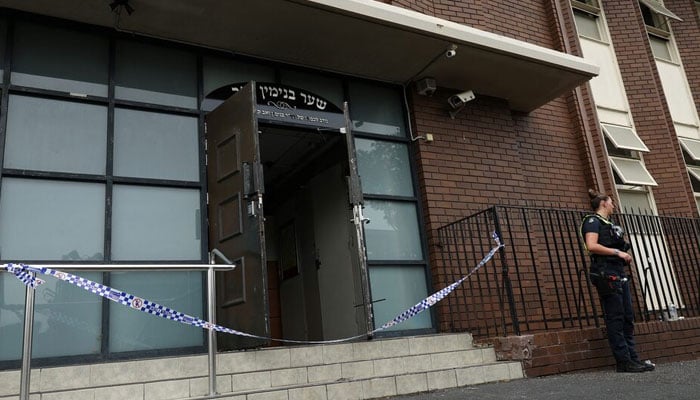
The government will designate Tehran’s Islamic Revolutionary Guard Corps (IRGC) as a terrorist organisation, Albanese added.
Foreign Minister Penny Wong said Ambassador Sadeghi and three Iranian officials had seven days to leave, in Australia’s first expulsion of an envoy since World War II.
“Iran’s actions are completely unacceptable,” she told the briefing.
The IRGC was directing people in Australia to undertake crimes, said Mike Burgess, director general of the security agency.
“They’re just using cut-outs, including people who are criminals and members of organised crime gangs to do their bidding or direct their bidding,” he added.
Israel’s embassy in Australia welcomed the action against its major rival Iran.
“Iran’s regime is not only a threat to Jews or Israel, it endangers the entire free world, including Australia,” it said in a statement on X.
The two countries fought a 12-day air war in June, after Israel launched attacks on Iran’s nuclear facilities.
Iran’s actions were an attack on Australia’s sovereignty, said Daniel Aghian, president of the Executive Council of Australian Jewry (ECAJ), an umbrella group of more than 200 organisations.
“These were attacks that deliberately targeted Jewish Australians, destroyed a sacred house of worship, caused millions of dollars of damage, and terrified our community,” he said on Tuesday.
Two men charged
Two men have been charged over the December attack that set ablaze the synagogue, built in the 1960s by Holocaust survivors in the suburb of Ripponlea.
Last week, police in the southeastern state of Victoria said they were examining electronic devices seized in a search of the home of one of the men, who is set to appear in court on Wednesday.
Police say three people broke into the synagogue and set the fire.
Fire gutted the kosher restaurant in Bondi, Lewis Continental Kitchen. The media said the man arrested in January over that attack had links to a well-known Australian motorcycle gang. He denied the charges in court and was freed on bail.
The Australian Iranian Community Organisation welcomed the expulsion and the move to declare the IRGC as a terrorist group.
“We are really happy to see them go,” its president, Siamak Ghahreman, told the Australian Broadcasting Corporation in an interview.
About 90,000 Iranian-born people live in Australia.
Ties between Israel and Australia have been strained since Canberra’s centre-left government decided to recognise a Palestinian state on August 11.
The move came after tens of thousands marched across Sydney’s Harbour Bridge, calling for peace and aid deliveries to Gaza, where Israel began an offensive nearly two years ago after the Hamas’s attack.
Palestinian authorities say the conflict has killed more than 62,000 people in Gaza, while humanitarian groups say Israel’s blockade has caused a food shortage that is leading to widespread starvation.
On Sunday, thousands joined nationwide pro-Palestinian protests prompting the ECAJ to warn they were leading to an “unsafe environment”.
Some Jewish organisations in Australia have supported the rallies, however.
Rights groups have flagged a worldwide rise in antisemitism, Islamophobia and anti-Arab bias during the war.
Australian civil society group, the Islamophobia Register, recorded a 500% rise in Islamophobic incidents in workplaces, universities and the media since October 2023, with 1,500 incidents reported.
Politics
Former South Korean president yoon sentenced to five years in prison
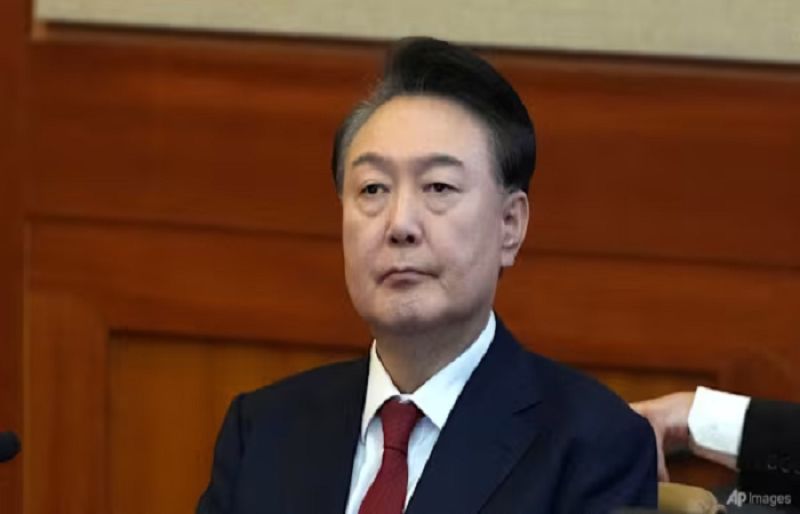

A South Korean court on Friday sentenced former President Yoon Suk Yeol to five years in prison on charges that included obstructing attempts by authorities to arrest him following his failed bid to impose martial law in December 2024.
The Seoul Central District Court found Yoon guilty of mobilising the presidential security service to block authorities from executing an arrest warrant that had been legally issued by a court to investigate him for his martial law declaration.
In televised proceedings, he was also found guilty of charges that included fabricating official documents and failing to comply with the legal process required for martial law.
The ruling is the first related to the criminal charges Yoon faces over his botched martial law declaration.
“The defendant abused his enormous influence as president to prevent the execution of legitimate warrants through officials from the Security Service, which effectively privatised officials … loyal to the Republic of Korea for personal safety and personal gain,” the lead judge on the three-justice panel said.
Speaking outside the court immediately after the decision, one of Yoon’s lawyers, Yoo Jung-hwa, said the former president would appeal the ruling. “We express regret that the decision was made in a politicised manner,” she said.
He could face the death sentence in a separate trial on a charge of masterminding an insurrection by declaring martial law without justification.
Yoon has argued it was within his powers as president to declare martial law and that the action was aimed at sounding the alarm over the obstruction of government by opposition parties.
Yoon, who also denied Friday’s charges, could have faced up to 10 years in jail over the obstruction charges related to when he barricaded himself inside his residential compound in January last year and ordered the security service to block investigators.
He was finally arrested in a second attempt involving more than 3,000 police officers. Yoon’s arrest was the first ever for a sitting president in South Korea.
Parliament, joined by some members of Yoon’s conservative party, voted within hours to overturn his surprise martial law decree and later impeached him, suspending his powers.
He was removed from office in April last year by the Constitutional Court, which ruled he violated the duties of his office.
While Yoon’s bid to impose martial law lasted only about six hours, it sent shockwaves through South Korea, which is Asia’s fourth-largest economy, a key US security ally, and long considered one of the world’s most resilient democracies.
Politics
South Korean ex-leader jailed for 5 years in first martial law verdict
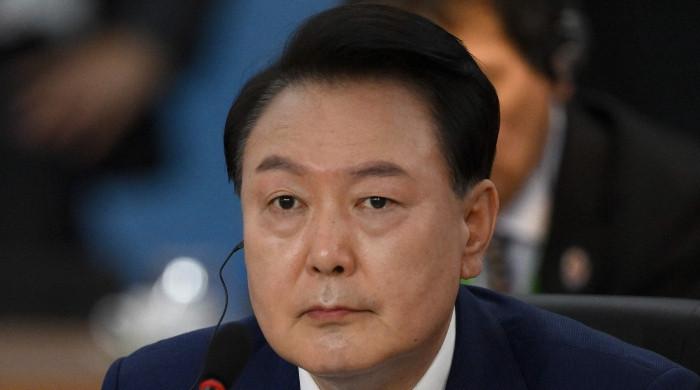

- Judge finds Yoon guilty of obstructing justice and other crimes.
- Separate insurrection verdict is scheduled for February 19.
- Yoon faces another trial over alleged drone flights to North Korea.
SEOUL: A South Korean judge sentenced former president Yoon Suk Yeol on Friday to five years in prison for obstructing justice and other crimes linked to his disastrous martial law declaration and in its chaotic aftermath.
It is the first in a series of verdicts for the disgraced ex-leader, whose brief suspension of civilian rule in South Korea on December 3, 2024 prompted massive protests and a showdown in parliament.
Now ousted from power, he faces multiple trials for actions taken during that debacle and in the turmoil that followed.
On Friday Judge Baek Dae-hyun at Seoul’s Central District Court said he found Yoon guilty of obstruction of justice by blocking investigators from detaining him.
Yoon was also found guilty of excluding cabinet members from a martial law planning meeting.
“Despite having a duty, above all others, to uphold the Constitution and observe the rule of law as president, the defendant instead displayed an attitude that disregarded the… Constitution,” Baek said.
“The defendant’s culpability is extremely grave,” he said.
But Yoon was not guilty of forging official documents due to lack of evidence, the judge said.
Yoon has seven days to appeal, he added.
Prosecutors had called for a 10-year prison term, while Yoon had insisted no law was broken.
Yoon defiant
It comes days after prosecutors in a separate case demanded Yoon be sentenced to death for his role as the “ringleader of an insurrection” in orchestrating the imposition of martial law.
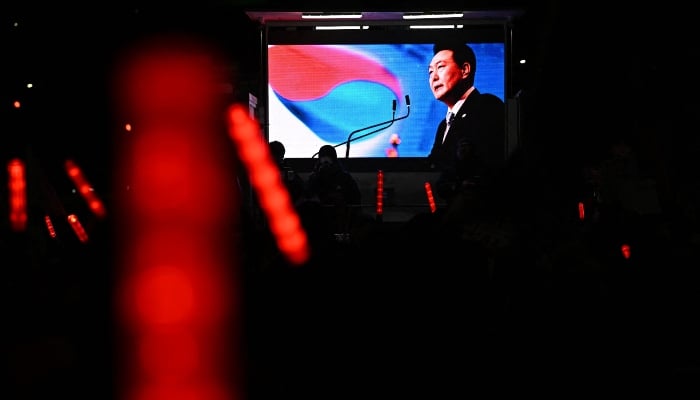
They argued Yoon deserved the severest possible punishment as he had shown “no remorse” for actions that threatened “constitutional order and democracy”.
If he is found guilty it is highly unlikely the sentence will actually be carried out, as South Korea has had an unofficial moratorium on executions since 1997.
Yoon was seen smiling in court as the prosecutors demanded the punishment.
And the former leader and top prosecutor has remained defiant, saying his martial law declaration was a lawful exercise of his presidential authority.
In closing remarks on Tuesday, he insisted the “exercise of a president’s constitutional emergency powers to protect the nation and uphold the constitutional order cannot be deemed an act of insurrection”.
He accused the then-opposition party of having imposed an “unconstitutional dictatorship” through their control of the legislature.
“There was no other option but to awaken the people, who are the sovereign.”
The court is scheduled to rule on the insurrection charges on February 19.
Yoon also faces a separate trial on charges of aiding the enemy, over allegations he ordered drone flights over North Korea to bolster his case for declaring martial law.
Politics
Trump accepts Nobel medal from Venezuelan opposition leader Machado


- Machado says meeting was ‘excellent,’ but did not elaborate.
- Encounter comes as Trump has praised Caracas’ interim leader.
- Trump has prioritised securing access to Venezuelan oil.
WASHINGTON: Venezuelan opposition leader Maria Corina Machado gave her Nobel Peace Prize medal to US President Donald Trump on Thursday during a White House meeting, as she tries to gain some influence over how the president shapes the South American country’s political future.
A White House official confirmed that Trump intends to keep the medal.
In a social media post on Thursday evening, Trump wrote: “Maria presented me with her Nobel Peace Prize for the work I have done. Such a wonderful gesture of mutual respect. Thank you Maria!”
Machado, who described the meeting as “excellent,” said the gift was in recognition of what she called his commitment to the freedom of the Venezuelan people.
Machado’s attempt to sway Trump came after he dismissed the idea of installing her as Venezuela’s leader to replace the deposed Nicolas Maduro. Trump openly campaigned for the prize before Machado was awarded it last month and complained bitterly when he was snubbed.
Though Machado gave Trump the gold medal that honorees receive with the prize, the honor remains hers; the Norwegian Nobel Institute has said the prize cannot be transferred, shared or revoked.
Asked on Wednesday if he wanted Machado to give him the prize, Trump told Reuters: “No, I didn’t say that. She won the Nobel Peace Prize.”
The Republican president long expressed interest in winning the prize and has at times linked it to diplomatic achievements.
The lunch meeting, which appeared to last slightly over an hour, marked the first time the two have met in person. Machado then met with more than a dozen senators, both Republican and Democratic, on Capitol Hill, where she has generally found more enthusiastic allies.
While the visit was ongoing, White House press secretary Karoline Leavitt said Trump had been looking forward to meeting Machado, but that he stood by his “realistic” assessment that she did not currently have the support needed to lead the country in the short term.
Machado, who fled Venezuela in a daring seaborne escape in December, is competing for Trump’s ear with members of Venezuela’s government and seeking to ensure she has a role in governing the nation going forward.
After the US captured Maduro in a snatch-and-grab operation this month, various opposition figures, members of Venezuela’s diaspora and politicians throughout the US and Latin America have expressed hope that Venezuela will begin the process of democratisation.
-

 Politics1 week ago
Politics1 week agoUK says provided assistance in US-led tanker seizure
-

 Entertainment1 week ago
Entertainment1 week agoDoes new US food pyramid put too much steak on your plate?
-

 Entertainment1 week ago
Entertainment1 week agoWhy did Nick Reiner’s lawyer Alan Jackson withdraw from case?
-

 Sports5 days ago
Sports5 days agoClock is ticking for Frank at Spurs, with dwindling evidence he deserves extra time
-

 Business1 week ago
Business1 week agoTrump moves to ban home purchases by institutional investors
-

 Sports1 week ago
Sports1 week agoPGA of America CEO steps down after one year to take care of mother and mother-in-law
-

 Tech4 days ago
Tech4 days agoNew Proposed Legislation Would Let Self-Driving Cars Operate in New York State
-

 Business1 week ago
Business1 week agoBulls dominate as KSE-100 breaks past 186,000 mark – SUCH TV



